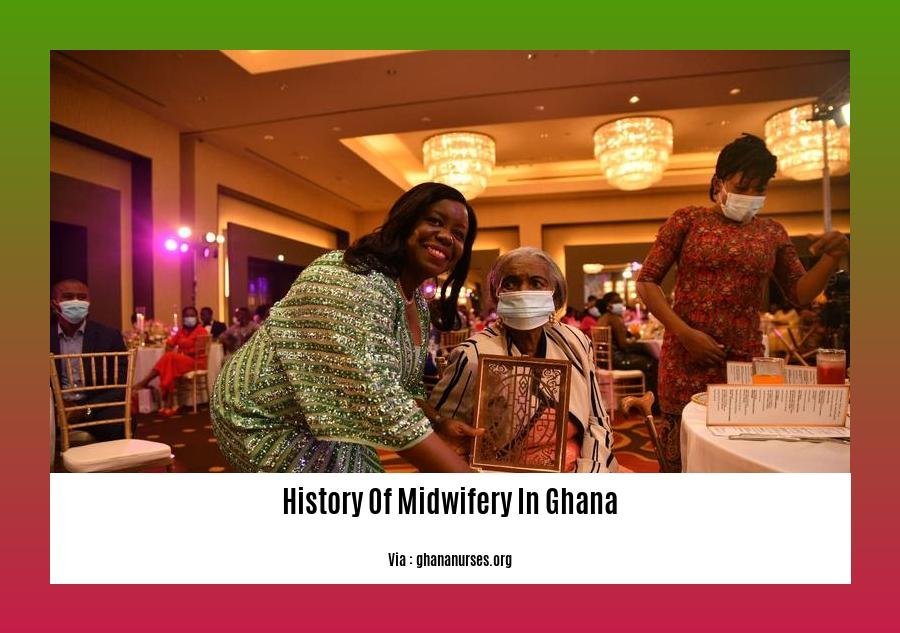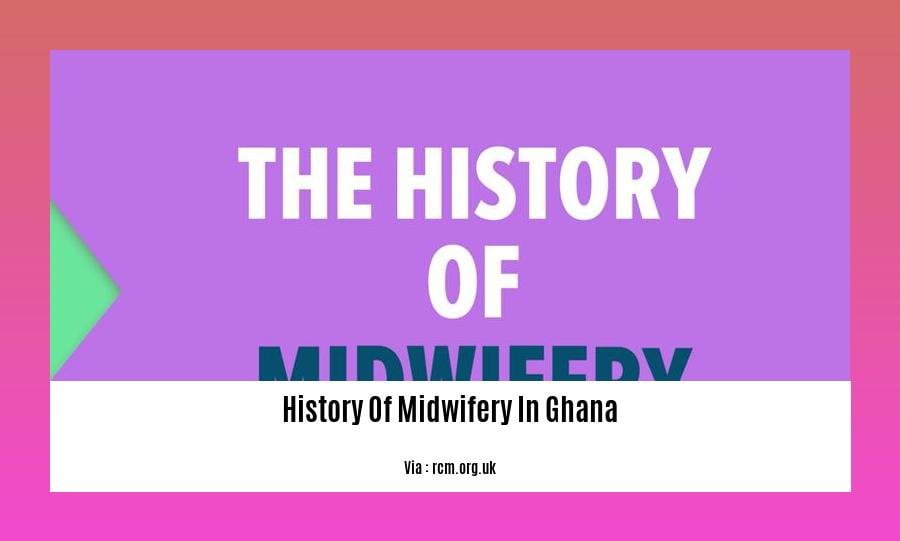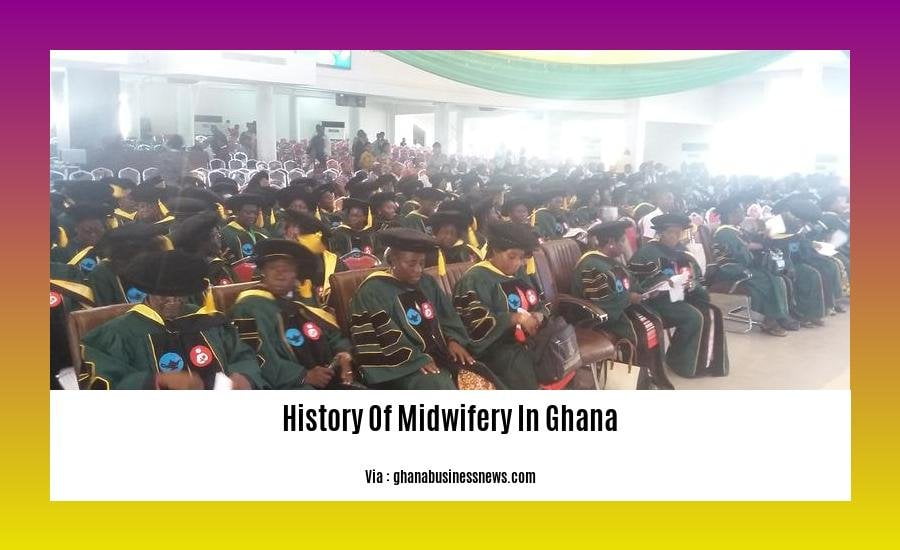In the realm of healthcare, the history of midwifery in Ghana holds a significant place, resonating with tales of compassion and care. We embark on an insightful journey to explore the rich heritage of these dedicated healthcare providers, uncovering the remarkable stories of individuals who have shaped maternal and child health outcomes in Ghana. Through the lens of history, we delve into the evolution of midwifery practices, showcasing the invaluable contributions of midwives to the well-being of generations. [- Exploring the History of Midwifery in Ghana: A Legacy of Compassion and Care].
Key Takeaways:
In the late 19th and early 20th century, nursing in Ghana was dominated by men, while midwifery was introduced to combat infant mortality specifically.
By 1960, the Ghana Registered Nurses and Midwives Association was established, merging two earlier nursing organizations. This association represented Ghana on the global stage through the International Council of Nurses.
In 2020, the Nursing and Midwifery Council launched a book chronicling the history of these professions in Ghana.
Since 2015, the Ghana College of Nurses and Midwives has provided postgraduate-level training, and a system is in place to monitor and evaluate the quality of the education and practice
A fascinating area that sheds light on the development of healthcare in Ghana is the history of midwifery.
History of Midwifery in Ghana

The history of midwifery in Ghana is characterized by its profound contributions to maternal and child health, alongside its enduring legacy of compassion and care. It is a rich tapestry of historical events, pioneering individuals, and professional milestones that have shaped the profession’s identity and impact in the country. In the late 19th and early 20th centuries, Ghana’s nursing landscape was dominated by men, with midwifery emerging as a distinct profession aimed at reducing infant mortality.
A pivotal moment in Ghana’s midwifery journey occurred in 1960 when two professional nursing associations merged to form the Ghana Registered Nurses and Midwives Association (GRNMA). This unified body represented the nation at the International Council of Nurses, solidifying Ghana’s standing in the global nursing community.
In 2020, the Nursing and Midwifery Council (NMC), the governing body for the profession, unveiled a historical book detailing the journey of midwifery in Ghana. This publication shed light on the profession’s evolution, challenges, and successes, serving as a valuable resource for researchers, practitioners, and policymakers.
Another significant milestone was achieved in 2015 when the Ghana College of Nurses and Midwives (GCNM) initiated postgraduate training for specialists in midwifery. This initiative aimed to elevate the quality of midwifery education and practice in Ghana, establishing a robust monitoring and evaluation framework to ensure the highest standards.
The history of midwifery in Ghana is replete with stories of exceptional individuals who dedicated their lives to improving the well-being of mothers and newborns. These trailblazers championed evidence-based practices, advocated for policy reforms, and mentored generations of midwives, leaving an indelible mark on the profession.
Today, midwives in Ghana continue to play a crucial role in ensuring safe pregnancies, skilled deliveries, and postpartum care. They are the backbone of Ghana’s maternal and child health system, providing compassionate and competent care to women and families across the country.
As we delve deeper into the history of midwifery in Ghana, we gain a profound appreciation for the dedication, resilience, and expertise of these remarkable healthcare providers. Their unwavering commitment to maternal and child health has undoubtedly contributed to Ghana’s progress towards achieving its health-related Sustainable Development Goals.
Want to know the fascinating evolution of men’s hairstyles throughout history? Here we delve into the history of men haircuts and their cultural significance across different eras.
Challenges faced by midwives in Ghana, including limited resources and socio-cultural barriers
Providing midwifery care in Ghana comes with unique challenges that midwives must navigate daily. Let’s dive into some of these obstacles:
Limited Resources:
Midwives in Ghana often face a scarcity of essential resources that hinder their ability to provide optimal care. Equipment shortages, such as fetal monitors, suction machines, and delivery beds, are common in many health facilities. This lack of equipment can compromise the safety and quality of care for both mothers and newborns.
Socio-Cultural Barriers:
Cultural beliefs and practices can sometimes pose barriers to effective midwifery care. For instance, some communities may hold traditional beliefs about childbirth that conflict with evidence-based midwifery practices. This can lead to resistance or reluctance from families to accept certain interventions or treatments recommended by midwives.
Logistical Challenges:
Transportation and access to healthcare facilities can be significant obstacles for midwives and the communities they serve. In rural areas, poor road conditions and long distances to health centers make it challenging for midwives to reach patients in need. This can result in delayed or missed appointments, affecting the continuity of care.
Inadequate Training and Education:
Limited opportunities for in-service training and continuing education can hinder midwives’ ability to stay up-to-date with the latest advancements in midwifery care. This can impact the quality of care provided and limit midwives’ ability to respond to new challenges and emergencies effectively.
Workforce Shortages:
Ghana faces a chronic shortage of midwives, particularly in rural and underserved areas. The high demand for midwifery services, coupled with limited training capacity, contributes to this shortage. This can lead to increased workloads for existing midwives, affecting the quality of care and potentially leading to burnout.
Key Takeaways:
Resource limitations, including equipment shortages and inadequate infrastructure, hinder the provision of comprehensive midwifery care.
Socio-cultural barriers, such as traditional beliefs and practices, can affect the acceptance of evidence-based midwifery interventions.
Logistical challenges, like poor transportation and long distances to healthcare facilities, impede access to midwifery care, especially in rural areas.
Limited in-service training opportunities restrict midwives’ ability to stay current with the latest advancements in midwifery care.
Workforce shortages, particularly in rural areas, increase midwives’ workloads and impact the quality of care provided.
Sources:
Challenges faced by midwives working in rural communities in the Upper East Region of Ghana
Challenges experienced by midwives working in rural Ghana: a qualitative study
Government initiatives and NGOs supporting midwifery education and practice in Ghana

Supporting and promoting midwifery education and practice in Ghana has been greatly influenced by various government initiatives and NGOs. Let’s delve into the significant contributions they have made:
Government Efforts for Midwifery Advancement:
Nurse and Midwife Training Colleges: The government established these institutions to provide comprehensive midwifery training, ensuring a steady supply of skilled midwives in various communities.
Scholarships and Financial Aid: To encourage more individuals to pursue midwifery education, the government provides scholarships and financial assistance, making it accessible for students from diverse backgrounds.
The Impact of NGOs in Midwifery Education:
Capacity Building Programs: NGOs have initiated capacity-building programs for midwives, offering training workshops and seminars to enhance their skills and knowledge in essential areas of midwifery care.
Community-Based Education: NGOs collaborate with local communities to establish community-based midwifery education programs, fostering greater accessibility and encouraging local involvement in maternal healthcare.
Mentorship and Leadership Development: Through mentorship programs, NGOs support experienced midwives in mentoring and guiding younger midwives, promoting leadership development within the profession.
Collaboration for Midwifery Excellence:
Partnerships with Government: NGOs collaborate closely with government agencies to align their efforts and resources, ensuring a cohesive approach to midwifery education and practice.
Skill Enhancement Initiatives: NGOs provide technical assistance and support to government-run midwifery training institutions, enhancing their infrastructure and curriculum to meet international standards.
Key Takeaways:
- Government-established Nurse and Midwife Training Colleges provide comprehensive midwifery education.
- Scholarships and financial aid are offered by the government to support students pursuing midwifery studies.
- NGOs conduct capacity-building programs to enhance the skills and knowledge of midwives.
- NGOs collaborate with communities to establish community-based midwifery education programs.
- NGOs facilitate mentorship and leadership development programs for midwives.
- NGOs collaborate with the government to align efforts and resources for midwifery education and practice.
- NGOs provide technical assistance to government-run midwifery training institutions to improve infrastructure and curriculum.
References:
– International Confederation of Midwives (ICM)
– Ghana Registered Nurses and Midwives Association (GRNMA)
Profiles of remarkable Ghanaian midwives and their impact on the profession
Embracing Ghana’s Midwifery Legacy:
Ghana’s midwifery landscape is a tapestry woven with the passion, dedication, and expertise of remarkable individuals. These dedicated healthcare providers have played a pivotal role in shaping the country’s maternal and child health outcomes. Join us as we celebrate the stories of these extraordinary midwives and their profound impact on Ghana’s healthcare system.
The Unsung Heroes: Celebrating Ghanaian Midwives
Throughout Ghana’s history, midwives have stood as beacons of hope, providing compassionate care, skilled assistance, and a comforting presence during childbirth. They have tirelessly worked in communities across the country, ensuring safe pregnancies and skilled deliveries, while nurturing the well-being of mothers and newborns.
Transforming Lives Through Dedication:
The commitment of Ghanaian midwives goes beyond delivering babies. They are educators, counselors, and advocates, tirelessly promoting maternal and child health awareness, dispelling myths, and empowering women to make informed choices about their reproductive health. Their tireless efforts have significantly contributed to reducing maternal and infant mortality rates, improving overall health outcomes for families across the nation.
Profiles of Excellence: Ghanaian Midwives Making a Difference
Comfort Ohene- Nyarko: A pioneering midwife and nurse who championed the establishment of the Ghana Registered Nurses and Midwives Association (GRNMA) in 1960, uniting the nursing community and advocating for professional recognition.
Margaret Brew-Ward: A trailblazing midwife and educator who played a crucial role in developing midwifery training programs in Ghana. Her unwavering dedication to education and mentorship has shaped generations of skilled midwives.
Vida Yeboah: A passionate advocate for maternal and child health, Vida Yeboah dedicated her career to improving access to quality healthcare services in rural communities. Her tireless efforts have transformed lives and brought hope to underserved populations.
Eunice Akosua Bannerman: A dedicated midwife and researcher, Eunice Bannerman’s work focused on improving maternal health outcomes through evidence-based practices. Her research has informed policy and practice, contributing to better care for mothers and newborns.
These extraordinary individuals represent just a fraction of the remarkable midwives who have shaped Ghana’s midwifery landscape. Their unwavering commitment, expertise, and compassion have left an indelible mark on the nation’s healthcare system, improving the lives of countless mothers and children.
Key Takeaways:
Ghanaian midwives have played a pivotal role in reducing maternal and infant mortality rates, improving maternal and child health outcomes.
The Ghana Registered Nurses and Midwives Association (GRNMA) was formed in 1960, uniting nursing associations and solidifying Ghana’s presence in the global nursing community.
Midwives in Ghana are not just healthcare providers but also educators, counselors, and advocates, promoting maternal and child health awareness and empowering women to make informed choices.
Exceptional midwives like Comfort Ohene-Nyarko, Margaret Brew-Ward, Vida Yeboah, and Eunice Akosua Bannerman have made significant contributions to Ghana’s midwifery landscape through their leadership, advocacy, education, and research.
Midwives in Ghana continue to face challenges such as limited resources, lack of recognition, and inadequate training opportunities, but they remain committed to providing quality care to mothers and newborns.
Citations:
The Image of Nurses and Midwives in Ghana: Patient and Family Perspective
Narrative Inquiry into the Professional Identity-Making of Ghanaian Midwives
FAQ
Q1: What are some of the challenges midwives in Ghana have faced historically?
A1: Historically, midwives in Ghana have faced various challenges, including a lack of motivation due to feeling unnoticed and uncompensated, logistical challenges due to insufficient equipment and basic consumables, limited in-service training opportunities, inadequate infrastructure, and a chronic shortage of midwifery staff.
Q2: How has midwifery education evolved in Ghana?
A2: Midwifery education in Ghana has undergone significant evolution. Initially, nursing was primarily a male occupation, while midwifery was established to address infant mortality. In 1960, two professional nursing associations joined to establish the Ghana Registered Nurses and Midwives Association, representing the country at the International Council of Nurses. In 2015, the Ghana College of Nurses and Midwives commenced training postgraduate specialists in the field.
Q3: What are some of the key moments in the history of midwifery in Ghana?
A3: Key moments in the history of midwifery in Ghana include the establishment of midwifery as a distinct profession to address infant mortality in the late 19th and early 20th centuries, the formation of the Ghana Registered Nurses and Midwives Association in 1960, the launch of a historical book on midwifery by the Nursing and Midwifery Council in 2020, and the commencement of postgraduate specialist training in midwifery by the Ghana College of Nurses and Midwives in 2015.
Q4: How has midwifery contributed to maternal and child health in Ghana?
A4: Midwifery has played a crucial role in improving maternal and child health in Ghana. Midwives have been instrumental in reducing infant mortality rates, providing prenatal and postnatal care, promoting breastfeeding, and educating mothers on proper childcare practices.
Q5: What are some of the current challenges facing midwifery in Ghana?
A5: Current challenges facing midwifery in Ghana include the need for increased motivation and compensation for midwives, improved logistical support with sufficient equipment and consumables, expanded in-service training opportunities, improved infrastructure, and a concerted effort to address the shortage of midwifery staff.
- SYBAU See You Baby Meaning: Gen Z Slang Evolves - July 1, 2025
- Unlock Your Inner Youth: Lifestyle Secrets for a Vibrant Life - July 1, 2025
- Decode SYBAU Meaning: Gen Z Slang Explained - July 1, 2025






